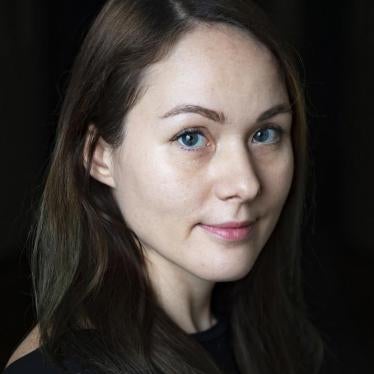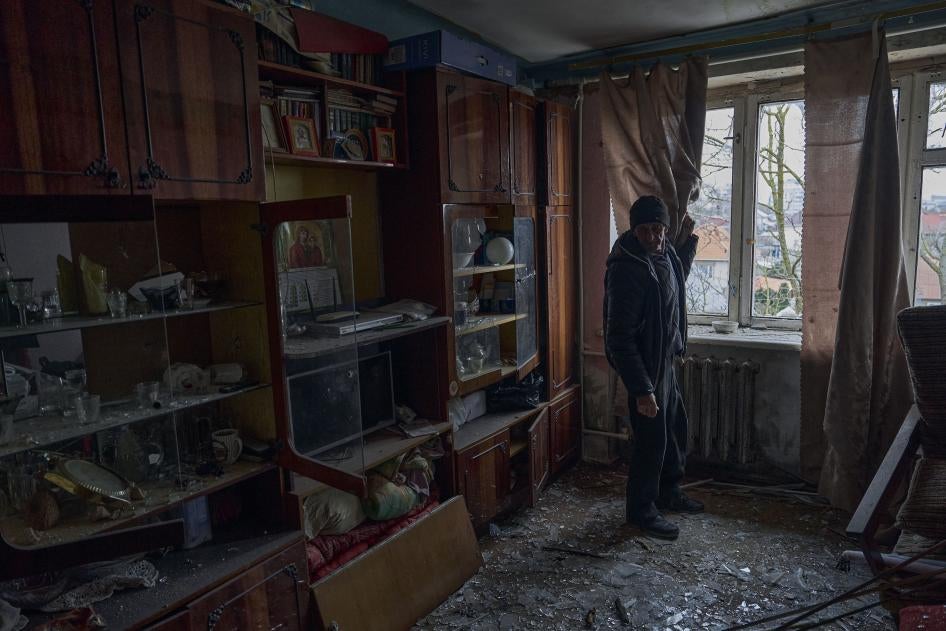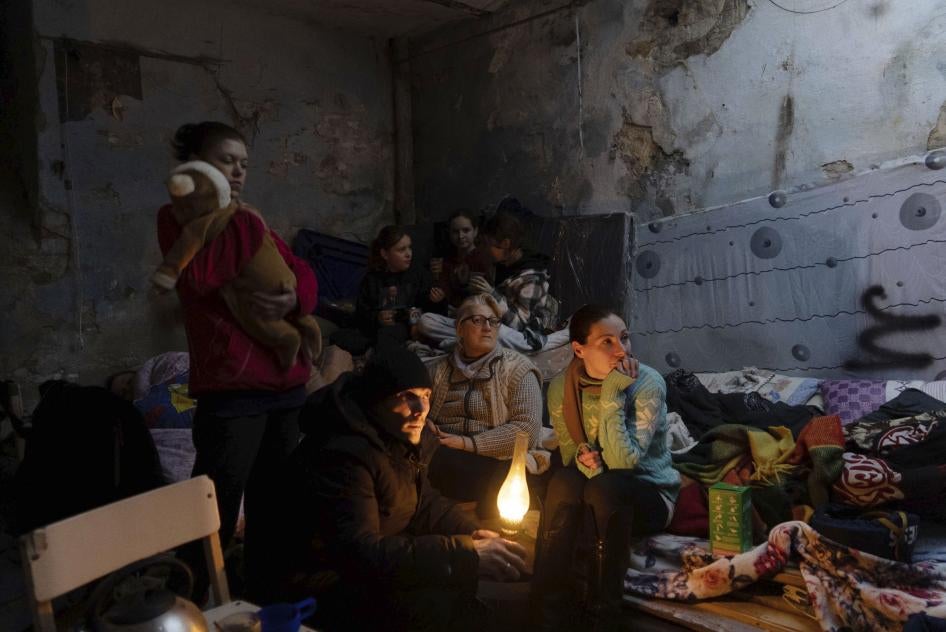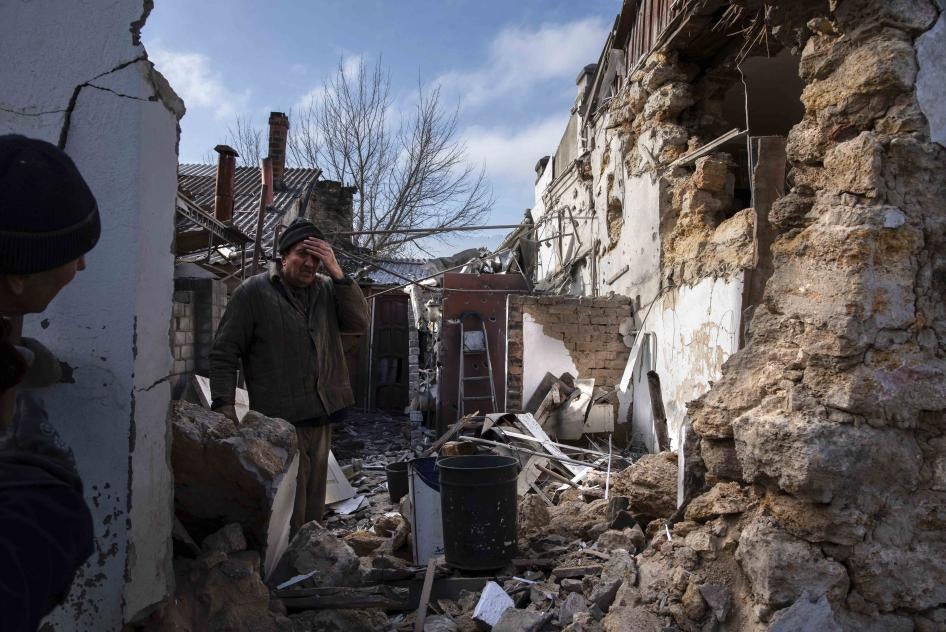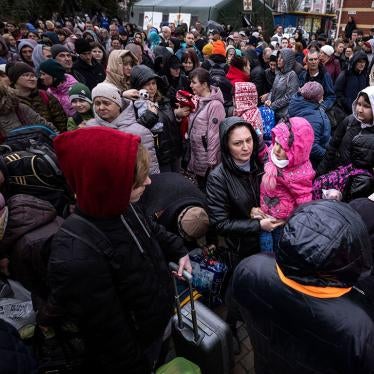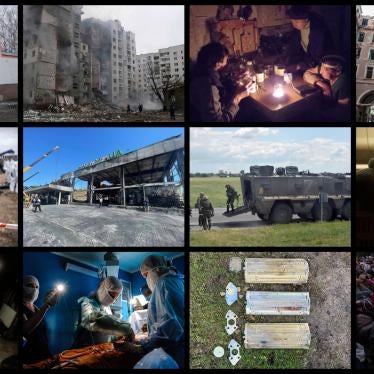My colleagues and I spent the past year documenting apparent war crimes and other atrocities of Russia’s war against Ukraine.
Russia first invaded Ukraine in 2014, occupying Crimea and instigating and supporting an armed conflict in the industrial eastern Donbas region. In February 2022, Russia unleashed a full-scale invasion, bringing death and suffering to millions of Ukrainian civilians.
In the last year, Russian forces have killed, raped, tortured, deported, or forcibly transferred civilians to Russia or Russian-occupied areas. More than 14 million Ukrainians have been forced to flee their homes. Millions have suffered from severely disrupted access to electricity and water due to Russia’s widespread targeting of Ukraine’s energy infrastructure.
My colleagues and I interviewed hundreds of Ukrainians who described what happened to them in cities under siege, like Mariupol, and in numerous towns and cities, like Kharkiv, that were hit repeatedly by air and artillery strikes. They told us about the Russian occupation forces’ atrocities, in places like Bucha, Borodianka, and Yahidne, and many other, lesser-known towns and villages.
I spoke with many of them when I was on the ground in Ukraine at various points throughout the year, and their words and accounts are impossible to forget.
Tatiana and Yulia, Mariupol
A 57-year-old woman from Mariupol, Tatiana, told me, “There is not a single family in Mariupol who didn’t bury someone, or doesn’t know someone who did.” Russian bombings wrought destruction in many Ukrainian cities, but perhaps none more than Mariupol, much of which was severely damaged or razed to the ground.
I spoke to Tatiana and her adult daughter, Yulia, in a women’s shelter in Lviv, in April, shortly after they escaped Mariupol. For more than a month they were trapped, like many others, in the besieged city. One morning in mid-March, they were awakened when a munition exploded right outside their apartment block. The blast wave shook the entire nine-story building, shattering the windows.
As they ran downstairs to the basement in panic, they heard screams for help from their neighbors’ apartments. The force of the blast wave had jammed some apartment doors, trapping people inside. When the building caught fire, people started jumping from the windows. When Yulia and Tatiana reached the fifth floor, another explosion hit, throwing Tatiana into the wall and breaking her arm.
They made it to the basement, where they remained for over a week with 50 neighbors, including children and older people. It was freezing, and they had barely any water or food. During their long and terrifying escape to Ukrainian-controlled territory, Russian forces subjected them and many other civilians to compulsory, abusive “filtration” screenings, which involved extensive questioning and searches, and collection of civilians’ biometric data.
Tatiana and Yulia made it to Lviv and were finally safe. But many others were forcibly transferred to Russia or Russian-occupied areas after undergoing “filtration.” Such transfers are war crimes and potential crimes against humanity.
***
For about eight months, Russia occupied a significant part of the Khersonska region. When Russian forces retreated in early November 2022, they left behind a legacy of destruction and countless abuses.
Liudmila, Posad-Pokrovs’ke
Liudmila had lived her entire life in the village of Posad-Pokrovs’ke, on the border of Khersonska and Mykolaivska regions. Although the village wasn’t occupied, it was practically destroyed by bombing and shelling.
“I lost everything,” Liudmila told me.
Several days after Russia’s invasion started, Liudmila’s husband, Serhii, went to Chernobaivka, about 27 kilometers from Posad-Pokrovs’ke, for work. That evening he called to say that he was coming to get Liudmila and their three daughters. Liudmila never heard from him again.
On March 10, local authorities called to say that her husband’s body had been found in a ditch near Chernobaivka, with bruises and a gunshot wound in his neck. Posad-Pokrovs’ke residents were not allowed to leave the village because of the fighting, so Liudmila, like many others, had to identify her loved one’s body through photographs the authorities sent to her phone.
They told Liudmila that Serhii was to be buried in a common grave in Mykolaiv. She begged them to allow her to bury him in a separate grave. Burial services chose a day when there was less shelling, and Liudmila buried Serhii on a video call, she told me matter-of-factly. With her house severely damaged and without her husband, who provided for the family, Liudmila didn’t know how she would be able to provide for their three young daughters.
Stas and Nastya, Khersonska oblast
In another village in the Kherson area, Zelenivka, which was under Russian occupation, 20-year-old Stas, a zookeeper at the Kherson zoo, told me how Russian soldiers came to the house of his girlfriend, Nastya. They called the couple and ordered them to come to the woman’s home. When Stas and Nastya arrived, the soldiers beat and took away her father, a retired veteran of military operations in Donbas in 2014. They also beat and kicked Stas and threatened to rape Nastya in front of him. Stas and Nastya were able to escape to Kyiv. They don’t know what happened to Nastya’s father.
I spoke to dozens of others whose family members had also been forcibly disappeared or who themselves were arbitrarily detained and tortured in a basement, a boiler room, or a squalid cell. As with Nastya’s father, Russian occupation forces suspected some of them of having a link to the Ukrainian military; others were local officials, journalists, or activists who opposed the occupation or were simply people perceived as having pro-Ukrainian or anti-Russian views.
The exact number of those forcibly disappeared is still unknown, and many remain missing.
Yurii’s “Re-education”
In areas they occupy for extended periods, Russian forces engage in “Russification,” erasing Ukrainian language, culture, and education, while brutally crushing dissent. Ukrainian civilians told me about being forced to sing Russian hymns or patriotic songs while Russian forces beat and tortured them as part of their “re-education.”
In April, Russian soldiers at a checkpoint detained Yurii, a Baptist pastor from Kherson, who had volunteered to help distribute humanitarian aid to local residents. The soldiers confiscated his car and several thousand dollars and took boxes of medicines and other humanitarian aid. They beat him and threw him in a cell. “They [the soldiers] told me, ‘Kherson was Russia in the 20s, haven’t you studied history?’” he said. “‘Repeat: this is Russia. Russia is here to stay.’”
From the start of the war, Russian officials and state-sponsored media increasingly questioned Ukraine’s sovereignty and its very right to exist. They’ve made progressively more extreme claims, from the need to protect ethnic Russians in Donbas and the Russian language to calling for “de-nazification” and even “de-satanization” of Ukraine. In reality, the war has devastated huge chunks of predominantly Russian-speaking areas of southern and eastern Ukraine.
Many people I spoke with told me that Russian soldiers and officials they encountered would repeat these claims to them, demanding residents to tell them where the “Nazis” were hiding.
Olena, Bucha
Some of these soldiers were like “kids, necks sticking out of their collars,” as Olena from Bucha told me in March, “kids, but with guns,” who went around executing civilians as though they were in a dystopian computer game. One of them pointed his Kalashnikov rifle at Olena in front of her house and threatened to shoot her on the spot. Another Russian soldier had shot and killed her husband, Viktor, a civilian, days earlier.
Millions of Ukrainian civilians have endured unimaginable trauma and loss during this war. An untold number are victims of war crimes and crimes against humanity. There has been an outpouring of international support to bolster Ukraine’s capacity to investigate and prosecute war crimes. The International Criminal Court prosecutor has opened an investigation, and foreign governments and international organizations have engaged numerous other accountability mechanisms and tools that could help ensure justice for atrocities committed in Ukraine.
This support needs to be translated into concrete accountability. People like Olena, Tatiana and others deserve meaningful redress and their suffering should never be forgotten.
